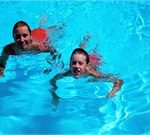Swimming pools in many parts of the United States may reopen soon, and Americans can take comfort in knowing that taking a dip should pose little risk of coronavirus infection.
However, there could be risks at indoor pools from crowds, poor air circulation, and contaminated surfaces such as handrails, according to Ernest Blatchley III, a professor of environmental and ecological engineering at Purdue University in West Lafayette, Ind.
He specializes in research on how chlorine in swimming pools reacts with contaminants such as human body fluids, medicines and personal care products.
“There are no data to show how the coronavirus responds to chlorine, but we do know that chlorine effectively inactivates similar viruses,” Blatchley said in a university news release.
“In the U.S., the general guidance for keeping pools properly disinfected is maintaining a free chlorine concentration between 1 and 5 milligrams per liter. If a pool has that concentration, there would be very little infective novel coronavirus in the water,” he explained.
However, the air around an indoor pool is likely “to pose similar risks of coronavirus spread as other indoor spaces,” he pointed out.
“A person’s risk would not be affected by the water. The most relevant issue would be contamination of the air or surfaces in these facilities,” said Blatchley, who has studied pool water treatment and chemistry for more than 20 years.
More information
The American Red Cross has more on staying safe during the coronavirus pandemic.
Source: HealthDay
Copyright © 2026 HealthDay. All rights reserved.
















